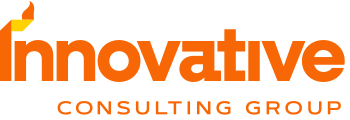In an exclusive interview for the popular podcast “This Week Health,” Dave Dyell, managing partner of Innovative, shared actionable insights on how healthcare leaders can best prepare their organizations for AI innovation. Watch the 12-minute conversation, filmed at the ViVE 25 conference in Nashville in February, and gain a deeper understanding of the challenges and opportunities for AI in healthcare.
Dyell had an insightful conversation with “This Week Health” podcast host Bill Russell to discuss AI readiness, application rationalization, and healthcare innovation. Dyell explained how application rationalization can identify cost savings and help organizations clean house in the runup to adopting new innovations like AI. He also stressed the importance of an AI readiness plan that establishes where the organization is currently and what needs to be done before, during, and after AI implementation to ensure success.
“AI readiness is really giving the CIO the ammunition they need to stand in front of their CEO and their Board and tell them where the organization really is, with concrete data. (We) hand them an executive summary…that shows them how unready the organization really is and gives them the ammunition to get the budget they need to prepare the organization for real,” Dyell said.
AI vendors typically provide software solutions without helping healthcare institutions develop a broader AI policy and framework. That can leave organizations implementing expensive solutions prematurely or with little alignment to the organization’s larger goals.
Dyell said Innovative helps prevent this by assessing the healthcare organization’s AI needs and readiness and developing data and governance models that will ensure oversight. What’s more, Innovative uses a technology-enabled model that can be completed in eight to 10 weeks, providing rapid return-to-value.
Here are more highlights from the interview:
Starting with an AI solution rather than an AI framework can be dangerous
Understanding a potential vendor’s data model is critical, said Dyell. “Is it aggregated data that’s coming from multiple health systems that’s forming the basis for that AI model, or is it going to be built on their data only? And how good is that data, depending on which model it is using?
“Don’t forget, AI cannot only learn the right thing, it can learn the wrong thing. So what’s the governance model that is going to ensure that the AI model is continuously being managed?”
Innovative helps health organizations create a framework for smart, strategic AI utilization before they invest in solutions, Dyell explained.
AI rollout requires strategic planning
Dyell emphasized that many of the AI vendors currently flooding the market may not be around in a few years. “You’re going to see new AI solutions continually coming out. So it’s better for the organization to step back, plan, get ready, think about where they really want to deploy it, and then go out and look for the vendors that are going to help them deliver whatever solution they are looking for.”
Speeding up application rationalization helps healthcare organizations realize cost savings quickly
“The biggest concern people have around application rationalization is the amount of time it takes. You’re typically looking at a 12- to 24-month effort. But what we’ve done is tech-enabled our solution, added a bit of AI into it, so basically within an 8- to 10-week process we can help return a true deliverable to the client that will really help them see exactly where their application portfolio is today.”
Dyell said this thorough assessment can help organizations make decisions about dependencies, pull-backs, overlaps, contracts, consolidations, and replacements—all of which can result in savings of millions of dollars.
A three-phased approach is best for application rationalization
Dyell said hospitals can benefit from working with Innovative beyond the 8- to 10-week initial assessment to start putting recommendations into practice. In phase two, Innovative helps organizations decommission, archive, and consolidate their technology stack, while phase three tackles contract management.
“How many CIOs truly understand all of these SaaS applications they’ve signed, how many different SLAs they have across them? Are they truly managing those? Are they leaving money on the table because the vendors haven’t lived up to the SLAs that they were supposed to? It’s pretty shocking how much money you can actually find on the table.”
An undisciplined AI and application rationalization approach threatens budgets at a vulnerable time
“We’re hearing a lot of angst,” Dyell added. “There are lots of words around Medicare and Medicaid cuts being thrown around everywhere. As we know, a lot of our facilities live and die on Medicare and Medicaid. There is a lot of concern around what that is going to do to their budgets and how that’s going to allow them to spend.”
Fortunately, healthcare organizations can use this uncertain time to achieve savings and avoid unnecessary spending through both strategic AI readiness and application rationalization, as Dyell discussed in the podcast. For a consultation to discuss your current, specific IT needs and concerns, contact Innovative at 833-412-9333 or email info@innovativecg.com.

